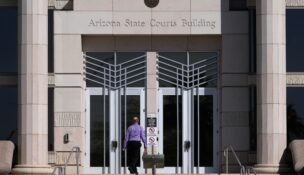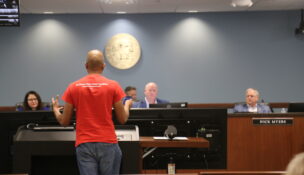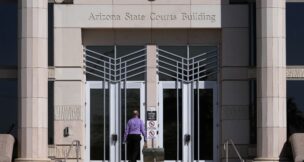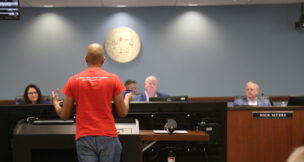GOP leaders squabble over school district’s financial woes
Kiera Riley Arizona Capitol Times//September 27, 2025//
GOP leaders squabble over school district’s financial woes
Kiera Riley Arizona Capitol Times//September 27, 2025//
Key Points:
-
Treasurer rejects $3 million advance for school district, cites mismanagement
-
State superintendent disagrees, claims district is entitled to funds under state law
-
District asks for reconsideration, blames high enrollment growth
Despite approval from the state Department of Education, Arizona Treasurer Kimberly Yee rejected a school district’s request for a $3 million cash advance to offset a deficit, alleging potential mismanagement and future financial instability.
Yee claimed “grave concern” over alleged “gross financial mismanagement” at Nadaburg Unified School District, located in Wittman in Maricopa County, and pushed for an audit and potential receivership given lopsided revenues and deficit.
State Superintendent of Public Instruction Tom Horne disagreed with the move to withhold the cash advance as the district was entitled to funds under state law.
The move puts Yee and Horne at odds over how to handle school districts in financial turmoil, as the two face-off in the 2026 Republican primary for superintendent of public instruction. And a request for additional review ropes in the district, the Joint Legislative Audit Committee, the auditor general and the State Board of Education.
“As Arizona’s Treasurer and a taxpayer watchdog, I am seriously concerned that an advancement of funds now will only compound the District’s deficit and harm the financial stability of the District for years to come,” Yee said in a statement.
On July 31, the NUSD Governing Board alerted state officials to a $5 million estimated cash deficit, citing a low ending fund balance from the prior fiscal year and decreased property tax collections.
The district then requested a $3 million advance of state aid funding to cover expenses through December, under a state law that allows early payment if sufficient funding, demonstrated financial need, and a sign-off from the state superintendent, treasurer and director of the state Department of Administration are present.
The request only got an OK from the Department of Education. A spokesperson for the Arizona Department of Administration stated that they were notified of the request, but it was never formally submitted to the department for review and approval.
Yee rejected the request on Sept. 24 and wrote the district had failed to provide any information on the necessity of expenses or any measures taken to reduce current spending to the bare minimum to sustain school operations.
She claimed the deficit could be “indicative of gross financial mismanagement,” noting the FY2026 total budgeted local revenues sit at $1.7 million, which would make the projected deficit near triple the total amount of revenue the district expects to receive.
“This is an alarming trend of financial instability,” Yee wrote.
Beyond notifying the district, Yee asked the Joint Legislative Audit Committee to issue a recommendation that the Arizona Auditor General’s Office conduct a special investigation of the district’s financials and requested the State Board of Education to consider any future findings from the auditor general to potentially appoint a receiver.
Sen. Mark Finchem, chair of JLAC, and co-chair Rep. Matt Gress did not respond to a request for comment. Auditor General Lindsay Perry confirmed the office had received and is reviewing the letter.
According to the January 2025 school district financial risk analysis by the Auditor General’s Office, NUSD was not listed as one of the highest risk districts but did have three red flags given a declining general fund operating reserve ratio, operating margin ratio and fund balance.
Yee reserved the right to reconsider and asked for a more detailed explanation of the necessary expenses, funding sources and spending decisions that led to the cash advance request, as well as their impact on the ability to manage expenses within the last fiscal year.
In departure from Yee, Horne said Yee’s denial of advance state aid was “pretty irresponsible.”
“I disagree with her,” Horne said. “The district has had unexpectedly fast growth, and cash advances are fairly common. They are entitled to it under the formulas.”
NUSD Superintendent Aspasia Angelou asked Yee to reconsider on similar grounds.
According to the auditor general, Nadaburg saw a 12.9% increase in weighted student count over the past year and a 100% increase over the past four years.
In a letter, Angelou said the “exponential enrollment growth” within the district was an exacerbating factor in the financial strain.
“This growth has placed extraordinary demands on our classrooms, facilities, transportation services, and staffing, all of which remain focused on delivering high-quality education to our students,” Angelou wrote. “As a result, our resources are stretched during the critical period between July 1 and the dates when property tax revenues are deposited to the district in January each year.”
She added that the district disagreed with Yee’s “financial mismanagement” charge and pointed to efforts to restructure operations and eliminate administrative positions.
“The ultimate risk in delaying or politicizing this decision is not borne by district leadership but by the students and families we serve, who rely on stable and uninterrupted school operations,” Angelou wrote.














































